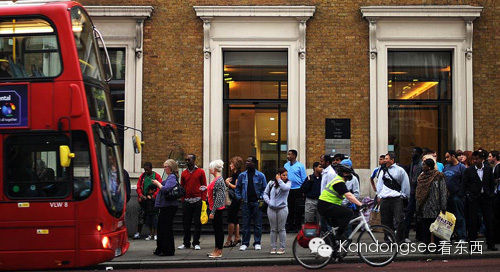 不排队就会死的英国人
不排队就会死的英国人“英国人就算独自一人,也会整整齐齐地排成一个人的队伍。”('AnEnglishman, even if he is alone, forms an orderly queue of one.')
匈牙利作家乔治·麦克斯(George Mikes)的这句名言贴切地总结了英国人对于排队的态度。外国游客经常会感叹英国人对排队的执着与热爱——看比赛要排队,逛超市要排队,就连等公交也排队!“排队强迫症”甚至成为了一个英国人自黑的经典梗。
This quote, from Hungarian authorGeorge Mikes, could be said to sum up the British attitude towards queuing.Visitors to Britain often remark on our almost obsessive love for standing inline - be it at sporting events, the supermarket, or even when waiting for thebus - and it is a frequent source of humour even among the British themselves。
排队的习惯深深植根于英国的民族精神中,以至于发展出了一整套排队礼仪。比如,如果队伍前段有两个人弄不清谁先谁后,他们会拼命请对方先上,同时还要一个劲地说:“您先请!您先请!”。插队则会引起人们的极度反感。不过,在人人含蓄内敛、不喜争执的英国,万一真的有人插队,也不会产生激烈的冲突,最多只会招来不满的轻嘘声。
The habit of queuing is soingrained in our national psyche that we have even developed an entireetiquette surrounding it. For example, if it is unclear to two people at thefront of a queue who is next, expect to see them both desperately attempt tousher the other to go first, each urging 'After you! After you!'. Queue-jumpingis heavily frowned upon - although, this being reserved, non-confrontationalBritain, in the rare event that someone does actually push in, their onlyrecrimination will come in the form of mildtutting.
话说回来,英国人的排队“强迫症”到底从何而来?有人认为,这种习惯可以追溯到十八世纪末至十九世纪初的第一次工业革命时期。当时,农村人口大量涌入大城市务工定居,由于城市人口的急速增长,商店等公共场所变得人流众多,因此迫切需要一种有秩序的等候方式——排队。
But just where does this customcome from? There are arguments that the practice dates back to the IndustrialRevolution, in the late 1700s and early 1800s.This was a time when rural peoplesuddenly migrated en-masse to our largest cities looking for work, and thesudden population growth in urban centres forced a need for more structuredsystems of waiting in places where many people gathered, such as shops。
然而,也有人称,第二次世界大战(1939-1945年)才是让英国人养成排队习惯的关键。在艰苦的战争年代,衣物、汽油乃至食物都严重供应不足,政府鼓励人们为社会贡献自己的一份力量,在物资短缺时期耐心等待配给。在这样的时代背景下,排队就成了英国社会所倡导的美德的象征——公平竞争、正直得体而又彬彬有礼。即使在今天,也有不少人将排队视作英国“国民精神”的体现——注重实效、冷静理性、恬淡寡欲。
However, it was arguably theSecond World War (1939-45) that really established the art of queuing as aBritish institution. During the tough war years – when clothes,petrol, and evenfood was in very short supply – the government heavily encouraged people to 'dotheir bit' for society, and patiently wait their turn through shortages. Thequeue thus came to be symbolic of a number of principles valued in Britishsociety: fair play, decency, and politeness. Even today, the queue is seen bysome to represent what they think of as the British 'national character' -pragmatic, un-emotional, and stoic.
最能体现英国人的排队礼仪的当属温布尔顿网球公开赛的购票队伍。温网是英国人民喜闻乐见的重大赛事。尽管比赛轰动全国,但购票现场从没起过争执。排队的人群总是井然有序,耐心等候。大家可能要排队等上几小时、几天,有时甚至露营彻夜等候,但没有人觉得不安,因为他们深信,只要耐心等待,总会轮到自己。
Perhaps nothing sums this upquite like the queue for tickets at Wimbledon, the annual tennis tournamentbeloved by many Brits. Despite it being a national sensation,there is never amad rush - just a patient, orderly queue. Those assembled wait for hours ordays, sometimes camping overnight - but satisfied in the knowledge that they,like everyone, will eventually have their turn.
编外:
我叫小鹿,是德国和美国的混血男孩,正经伦敦人!我现在在牛津主修中文,去年也在北大交换过一年。我对中西方之间的文化差异非常感兴趣!我觉得中西方之间比较缺乏很好的沟通和了解,而且这个体现在留学[微博]这一块。很多中国学生可能会直接找中介然后到了西方之后也不容易融入本地社会。前几天刚拍了第一部小片子“看东西带你体验牛津学霸们的快乐生活!” 哈哈。是不是很傻!:)
我们的文章一般先让外国学生写,然后让国内的学生翻译成中文(但我有时候也自己写中文然后翻译成英文!),所以我们的每篇文章都会发表双语版,可以一边学点关于本地文化,一边练点英语(而且是那种比较流行,口语话的英语,我们都是学生嘛,不喜欢写得太严肃!)。
我想今天跟大家分享一个好玩的关于英国排队文化的文章。所谓的腐国人彬彬有礼背后的玄机。。我们为什么那么爱排队呢?作者叫Sarah Bevan, 她在牛津是大三的学生,主修日文。翻译叫张海桦:她在清华[微博]大学[微博]是大一的学生,主修社会科学。
你如果觉得好玩的话,可以关注一下我们的微信平台。每几天会出一篇关于文化的文章,比如 “英国人为什么那么爱自黑”,“6招找出校园里的英伦’富儿代‘“等,微博账户也有,但粉丝不多哈哈,叫“看东西_Kandongsee”。
by Sarah Bevan (OxfordUniversity)
译张海桦(清华大学)
编辑推荐:
(声明:本文仅代表作者观点,不代表新浪网立场。)